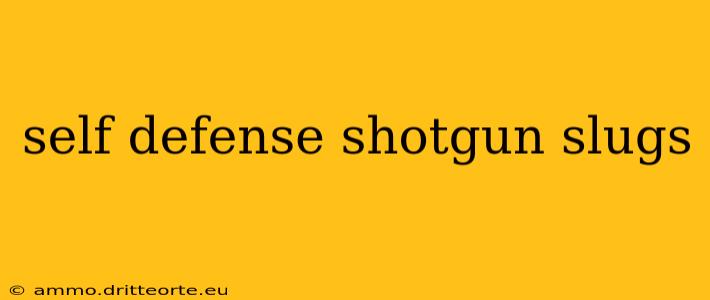Choosing the right ammunition for self-defense is a critical decision, and for shotgun owners, selecting the appropriate slug is paramount. This isn't just about stopping a threat; it's about minimizing collateral damage and ensuring responsible firearm use. This guide explores the key considerations when selecting self-defense shotgun slugs.
Understanding Shotgun Slug Types
Shotgun slugs are fundamentally different from shot. While shot disperses into numerous pellets, slugs are single projectiles designed for accuracy and stopping power at longer ranges. Several types are available, each with its strengths and weaknesses for self-defense:
1. Rifle Slugs:
- Characteristics: These slugs are typically made of lead or a lead alloy and feature a full metal jacket for better accuracy and reduced deformation. They're known for their relatively flat trajectory and longer effective range.
- Self-Defense Suitability: Excellent for longer distances, but the full metal jacket can increase overpenetration risk in close quarters. Consider carefully if your home environment necessitates a longer-range option.
2. Foster Slugs:
- Characteristics: These are classic, inexpensive lead slugs with a hollow base. The hollow base allows for greater expansion upon impact, potentially increasing stopping power.
- Self-Defense Suitability: Offers a balance between cost-effectiveness and stopping power. However, accuracy can suffer at longer ranges compared to rifle slugs, and the lead composition can increase the risk of environmental contamination in the event of a miss.
3. Brenneke Slugs:
- Characteristics: Known for their excellent accuracy and deep penetration. Brenneke slugs typically feature a hardened lead core with a plastic or metal sabot that helps stabilize the projectile in flight.
- Self-Defense Suitability: Offers impressive accuracy and penetration, but like rifle slugs, overpenetration is a significant concern in close-quarters self-defense situations.
4. Reduced-Recoil Slugs:
- Characteristics: These slugs are designed to minimize recoil, making them more manageable for smaller shooters or those unfamiliar with the substantial recoil of a shotgun. They often use lighter projectiles or specialized designs to achieve reduced recoil.
- Self-Defense Suitability: A good option for those prioritizing recoil reduction, but may sacrifice some stopping power compared to other types.
Key Considerations for Self-Defense Slug Selection
Beyond the slug type, several other crucial factors impact your choice:
1. Penetration:
This is arguably the most critical factor for self-defense. You need sufficient penetration to neutralize a threat, but overpenetration is a significant concern. A slug that passes through the target and into neighboring rooms or apartments poses unacceptable risks. Understanding your home's construction and the surrounding environment is essential.
2. Stopping Power:
Stopping power refers to a projectile's ability to immediately incapacitate a threat. While energy transfer is crucial, the slug's design, velocity, and the point of impact all play a significant role.
3. Accuracy:
Self-defense situations are often chaotic and stressful. Accurate shot placement is critical. Choose slugs known for their precision at your typical engagement distances.
4. Recoil:
Excessive recoil can make follow-up shots difficult and potentially dangerous. Consider reduced-recoil slugs if recoil management is a concern.
5. Legal Considerations:
Consult local and state laws regarding ammunition restrictions before making a purchase. Some jurisdictions may limit the types of slugs permissible for self-defense.
Conclusion
Selecting the right self-defense shotgun slugs is a serious responsibility. There's no one-size-fits-all answer; the ideal choice depends on your specific circumstances, home environment, and shooting proficiency. Thorough research, practical shooting experience, and consideration of all factors discussed above are crucial for making an informed decision that prioritizes both safety and effectiveness. Remember to always practice safe firearm handling and storage. This information is for educational purposes only and should not be considered legal or professional advice. Consult with firearms experts and law enforcement professionals for guidance specific to your situation.

